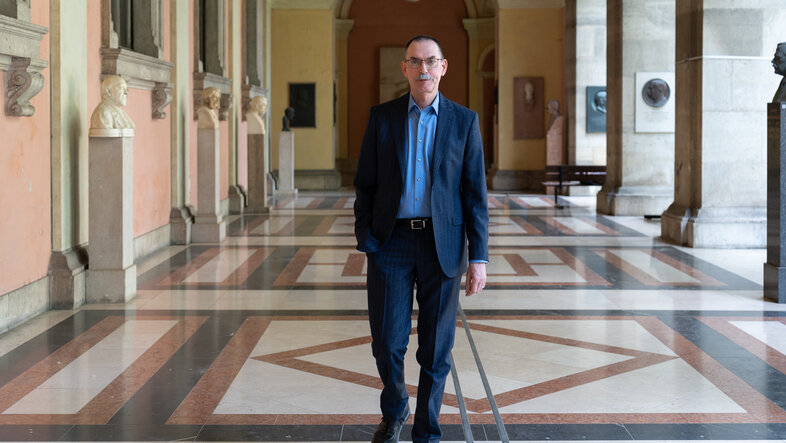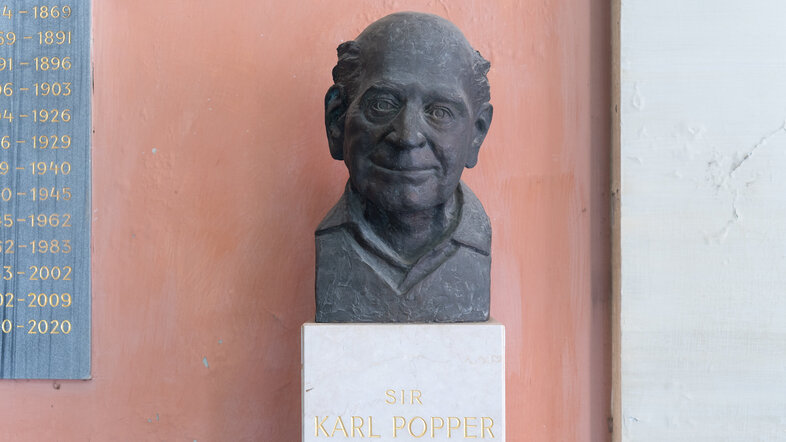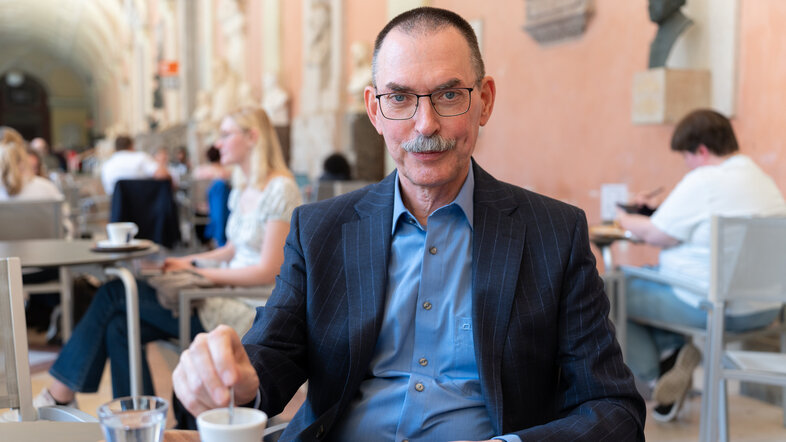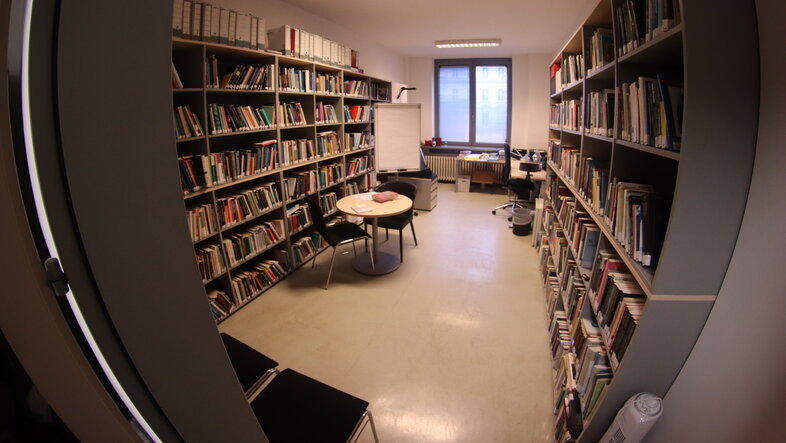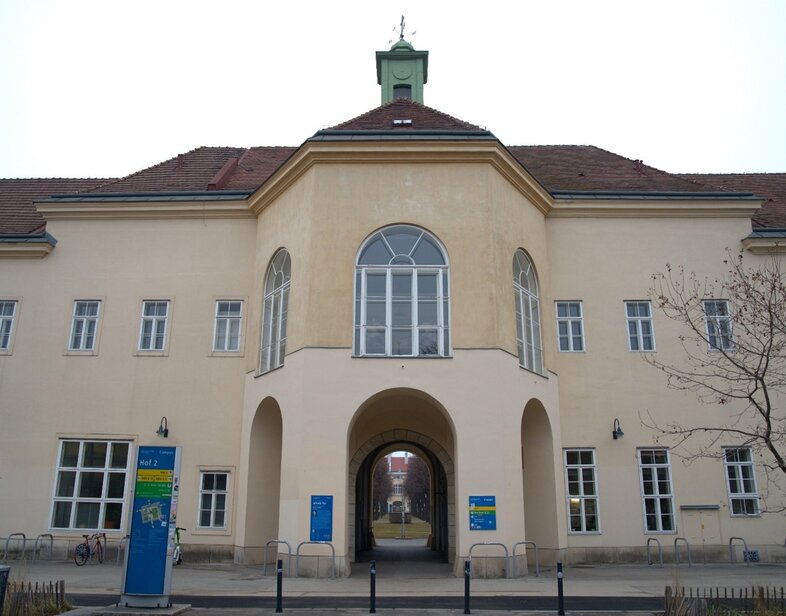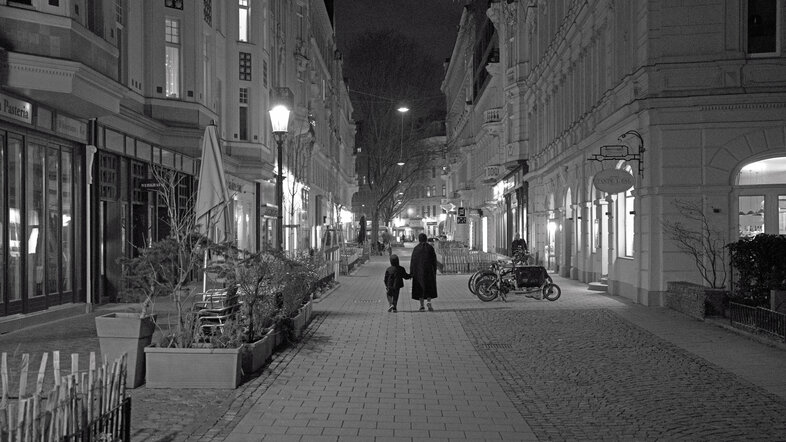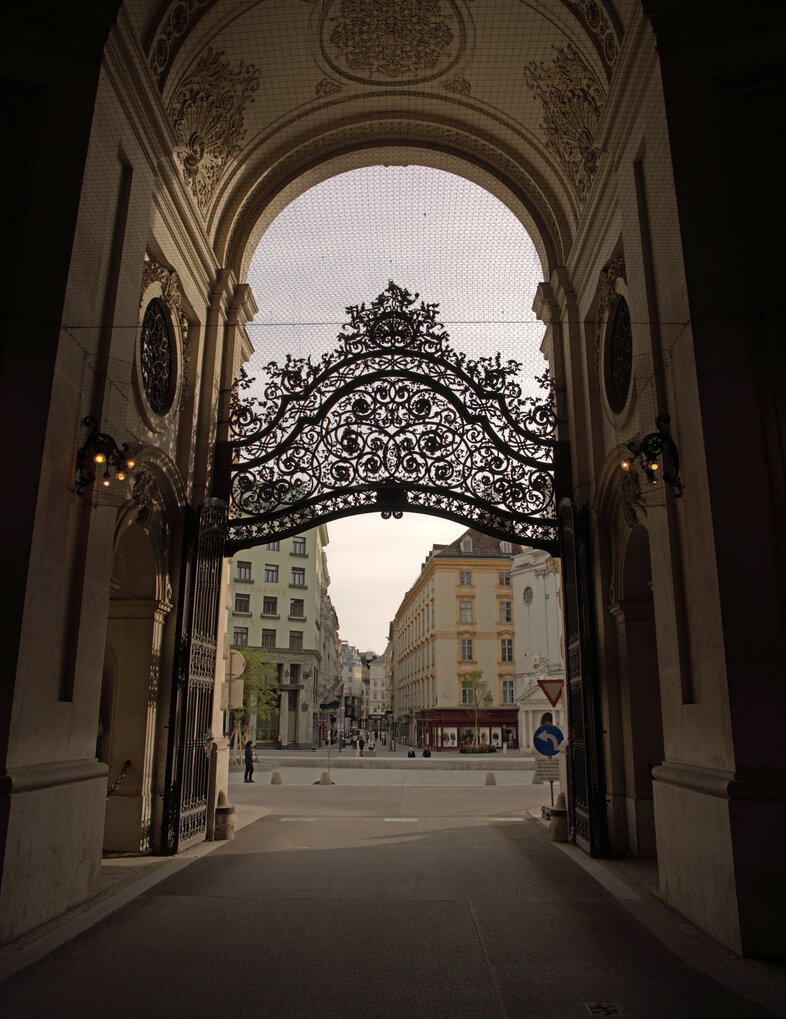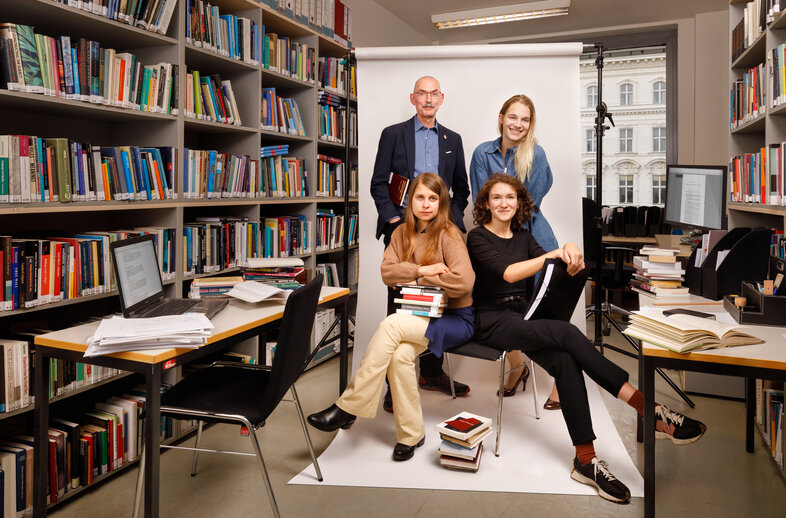A philosophy of history, relativism and despair
First Stop: Café Central
"…to avoid the long queues of tourists, one has to be there before 8 AM."
Martin Kusch is a philosopher who pays close attention to the social and historical contexts of knowledge production. It is therefore not surprising that the starting point of our walk is what was once at the heart of Vienna's historical intellectual scene—Café Central.
"I knew from my historical interest in Viennese philosophy just how important sitting in coffee shops was to intellectual life here," says the Professor of Applied Philosophy of Science and Epistemology at the University of Vienna. "So, when I came to Vienna myself, I thought this is the thing to do. I should meet people and discuss philosophy in coffeehouses."
Following his professorship at University of Cambridge, Kusch came to University of Vienna a decade and a half ago. Throughout his tenure, he has brought many academic colleagues and visitors to Café Central or Café Landtmann— spaces once frequented by the likes of Freud, Trotsky, and Popper— for long conversations and debates.
To make it happen, however, the philosophers had to get up early.
Are there such things as absolute truths?
And what was discussed in these cafés? Kusch raises one example. "I learnt much from sociologist and philosopher David Bloor." Bloor was a frequent visitor to Vienna during an ERC Advanced Grant project that Kusch led between 2014 and 2019. "We would argue endlessly about how best to define and defend relativism."
Relativism versus absolutism is one of the oldest debates in the humanities, appearing across a wide range of disciplines. Are there absolute facts, truths or standards in domains such as ethics, science, art, logic or the theory of knowledge? Absolutists answer 'yes'. Relativists, on the other hand, insist that the very idea of 'absolutes' does not make sense.
The ERC project, entitled "The Emergence of Relativism— Historical, Philosophical and Sociological Perspectives," examined the structure of these debates across historical and social contexts.
Is relativism enabling a post-truth world?
Relativism has acquired a somewhat negative reputation. Absolutists often accuse relativists of enabling ‘post-truth' ideologies. Kusch lays out the reasoning behind this step by step, premise by premise. "Absolutists see relativism as committed to the following train of thought," he explains:
- Standards for truth, knowledge, morality or beauty are relative to cultures.
- Cultures are all equally valid.
- Thus, standards are all equally valid.
- Hence, 'truth' as traditionally understood— namely as absolute— has to be given up.
- We are therefore in a 'post-truth' world.
According to Kusch, President Trump and his followers sometimes invoke premise (4). They think that there is one truth for 'legacy media,' another truth for the MAGA faithful, and that one has the right to choose.
Martin Kusch on science in a post-truth world
"Let's accept the deeply social nature of science."
In his TEDxVienna talk in 2019, Kusch argues that many sceptics of climate change research, including President Trump, have wrong ideas about science. Science is not done by a group of lone geniuses coming to a unanimous scientific consensus about undeniable foundational truths. Watch his talk to see why disagreement is a feature, not a bug, of the way we approach a complex world in the 21st century.
Watch the video here on Youtube.
In defense of sensible relativism
A major outcome of the project is the development of defensible forms of relativism. As Kusch put it, there is space between the position that 'we can't make sense of what it means for something to be absolute' and the statement that 'all positions are equally valid.' One does not lead to the other. "Take a simple example," he suggests: "We do not think that any one sense of taste is absolutely correct. But we do not infer from this that all tastes are equally correct. We do have wine connoisseurs whose judgement counts for more than that of the occasional drinker of cheap wines. Of course, as we turn to truth, knowledge, or morality, the arguments get much more complicated."
Through the careful exploration of these logical spaces, philosophers like Kusch demonstrate how we can open our minds to a dazzling world of nuance and possibilities.
The Emergence of Relativism— Historical, Philosophical and Sociological Perspectives
The ERC project examined relativism both historically and systematically. The historical challenge was to explore the roots of recent forms of relativism in 19th-century German-speaking lands. The systematic work sought to identify and distinguish good and bad arguments for and against relativism.
Many of the books that came out of the project, such as The Routledge Handbook of Philosophy of Relativism and Relativism in the Philosophy of Science, are important reference materials in the field.
Second stop: University of Vienna Main Building
Walking northward to the Ringstraße, we reach the inner edge of the old city centre. Our second destination is a place of many great minds: The "Arkadenhof" (arcaded courtyard) in the main building of the University of Vienna with its numerous busts and statues.
The location has a special significance for Kusch: "In 2008, having received the 'Ruf' (the job offer), I came to Vienna for the negotiations with Rektor Winckler. I arrived too early and spent an hour walking around the Arkadenhof. I was thrilled to see the busts of so many philosophers and scientists I had previously studied."
How to think about thinkers of the past
Here, Kusch talks about one of his central preoccupations— the "historiography of philosophy," that is, the question how one might approach the study of philosophers of the past. An example is Wittgenstein, an Austrian thinker central to Kusch's work.
For a long time, Wittgenstein has had something of a cult-like status in Anglophone philosophy. Remarks Kusch: "Many have tended to treat him as holding the key to all philosophical problems." Fortunately, Kusch notes, that time has passed. And this makes it possible to treat Wittgenstein as a historical figure "in his own time," rather than a prophet.
"One can approach the history of philosophy in very different ways," explains Kusch. One way to engage with a historical figure like Kant, Hegel or Wittgenstein is to see if they have (more or less direct) solutions to our current philosophical problems.
But we can also take a step back from our issues and try to immerse ourselves in the historical figures' intellectual and social worlds. This is what currently excites Kusch the most: "I want to understand what their philosophical problems really were and why they thought these problems were important."
How did Wittgenstein think about relativism?
Kusch is putting the finishing touches on a book— almost ready to be sent off to the Cambridge University Press— that focuses on Wittgenstein and relativism. "Quite a few people try to get ammunition from Wittgenstein to construct arguments for or against relativism." Yet Wittgenstein "never once in his published or unpublished writings even used the term 'relativism'."
This should give us pause, Kusch thinks.
Kusch therefore turns to a number of early-twentieth century debates— e.g., over the nature of logic, ethics or anthropology— in which versions of the opposition between absolutism and relativism played a crucial role. Interestingly, Wittgenstein commented on these controversies. And this gives Kusch a new angle: "I want to infer from these comments where Wittgenstein stood relative to the versions of relativism and absolutism of his day: 'Did he think that the positions, which were accused of as relativism, were defensible?'"
By examining how Wittgenstein worked through problems in his own socio-cultural context, we can find a way to relate his argumentative moves back to how we think about relativist claims.
I want to understand what their philosophical problems really were and why did they think these problems were important.Martin Kusch
Third stop: University of Vienna Campus
From the main building, we walk past the NIG (The New Institute Building), the home of the Department of Philosophy, to make our way to the Campus of the University of Vienna, also known as the Old Vienna General Hospital (Altes AKH).
On the way, Kusch opened up about his most current project, one close to his heart, or rather, pain.
Linguistic despair— when we lack the resources to express our pain
Victims or sufferers of torture, rape or severe pain have often lamented the difficulty of communicating their plight, especially to people who have not had to endure similar experiences. In his joint work with former Cambridge and later Viennese colleague, Matthew Ratcliffe, Kusch and the philosopher of mind and psychiatry speak of this phenomenon as "linguistic despair."
The topic has received most attention in the case of Holocaust survivors. A very important part of this incommunicability, suggests Kusch, is the problem of language, the shift in meaning of words. Consider the word 'doctor.' "The first association we have is a medical doctor, one meant to help and cure." But to the Holocaust survivor in the concentration camp, "the primary meaning of doctor is the one who goes around selecting people for execution."
One word, radically divergent meanings, completely different associations. Wittgenstein is an important resource for Kusch and Ratcliffe. After all, Wittgenstein showed how linguistic meaning and everyday "certainties" are closely intertwined. "It takes a great, long effort to appreciate what is being expressed by a language that is tightly tied to this extreme setting."
The Shoah Wall of Names Memorial, which we passed by while entering the Campus, stands in silent testimony.
Linguistic despair is the despair of lacking the verbal means to express an experience of severe suffering, e.g., extreme pain.Martin Kusch
How can one convey extreme suffering and despair?
Martin Kusch's interest in this issue arose in part from his own experience with chronic pain. In a dialogue with Ratcliffe, Kusch describes how pain-therapists still all too often deal with the challenge of communicating pain: "When a typical pain therapist meets their patients, they ask: 'On a scale from one to ten, how bad is your pain?'" But what is one and what is ten? The doctors must get creative. "One be a slight slap on your hand, and ten an amputation of your arm with a chainsaw, and without anaesthesia."
Pain is but one example. Women have long struggled to find words for men's sexist infringements. Philosopher Miranda Fricker speaks about the "hermeneutic injustice" that results from society not having helped women to find language to make sense of the many forms of sexual harassment.
Kusch and Ratcliffe are in the early stages of writing about the many faces of "linguistic despair." They use the tools of philosophy of language, philosophy of mind and political epistemology. And they closely study reports about the incommunicability of extremely painful situation from hunger to pain, harassment to torture.
"I feel Viennese"
Kusch is retiring this year, in 2025. Having philosophized in Vienna for this long, Martin Kusch now feels almost like a "real" Viennese. His cultural interests take him across the city.
During the Covid period, Kusch and his wife Sarah started to take long walks around Vienna. And to keep up with friends and colleagues, Kusch started to post photos of Viennese architecture on social media. "Covid is past, but photography has stuck." Even its philosophy has now become an interest.
As far as his own chronic pain is concerned, Kusch has found a surprising way to deal with it: visiting the Musikverein, playing the piano, and singing. "The best advice I ever got was that music— for reasons not well understood— helps against chronic pain."
As for what it is like to be a philosopher in Vienna these days, Kusch is happy about the way the department of philosophy has developed; how it has become highly successful in winning big grants; and how it has become an ever more international place.
But he regrets the fact that everyone is under ever greater stress, and so without time for sitting around coffeehouses.
Retirement lecture: The Road Ahead
In his retirement lecture on May 21st, Kusch will look forward, instead of backwards, to talk about the next phase of projects he will be working on. In addition to topics on relativism and linguistic despair, another project concerns the origin of the philosophy of social sciences in the German-speaking world, covering debates over the relationship between social and natural sciences; whether there are "social kinds" in addition to "natural kinds"; or whether sociology reduces to biology.
Learn more by registering for the event or by viewing it live online.
- When: Wednesday, May 21, 17:30
- Where: University of Vienna, Main Ceremonial Hall, Universitätsring 1, 1010 Wien
- More info: Event link
- Watch the livestream
Team Kusch called to the stage
At the beginning of the war in Ukraine, Martin Kusch and his team put together a project with extraordinary speed to help Ukranian philosophers. For this they received the International Award of the University of Vienna in 2022. Read their interview on the intranet (employees-only) as part of the "Employees called to the stage" initiative.
Kusch was born in Leverkusen (Germany) in 1959. He studied philosophy, history and linguistics in Finland. From 1993 to 1997, he was a lecturer in "Science Studies" at the University of Edinburgh. From 1997 to 2009 he worked at the Department of History and Philosophy of Science of the University of Cambridge, progressing from lecturer to full professor (in 2003).
